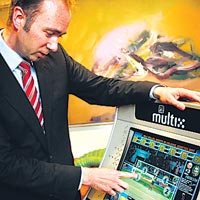
‘Hitting’ the jackpotCharity slot machines a thing of the past in Norway OSLO, (AFP) -Volunteer organisations and charities in Norway such as the Red Cross have for years made oodles of money by operating their own slot machines, but authorities are about to put an end to the practice. In a bid to combat gambling addiction, the Norwegian state has declared a monopoly on all slot machines and has given humanitarian organisations, volunteer groups and sporting clubs until July 1 to remove their machines from bars, supermarkets, airports, petrol stations and other locations. "There has been such an explosion of slot machine gambling in recent years that we had to do something to curb the social problems it causes," Halvard Ingebrigtsen, undersecretary of state at the ministry of culture and religious affairs, told AFP. At most there were some 18,500 slot machines across Norway, which has a population of 4.6 million.
The ban on charity slots "will affect the manna that goes to good causes but our main concern is this scourge of gambling addiction," Ingebrigtsen said. In a strange paradox that has seen vice fund virtue, slot machines have been one of the main sources of income for charities in the Scandinavian country. In 2005, they represented a third of the Norwegian Cancer Society's revenues, and more than half of those of the Red Cross. But authorities have decided to intervene in a bid to help the 71,000 or so Norwegians -- 1.5 percent of the population -- who are addicted to gambling and the 133,000 considered to be in the risk zone. The average gambling addict in Norway spends 5,000 euros (6,700 dollars) a year on gaming."Behind each person is a household. The gambler's problems don't stop with him, they also become the family's problems," said Lill-Tov Bergmo, the head of PTS, a support group for gambling addicts' families and loved ones. Slot machines run by charity groups and other private actors have increased their winnings three-fold in the five years from 2001 and 2006, when their gross sales ticked in at some 3.4 billion euros. The charities, well aware that they are in a delicate moral position, have agreed to cooperate with the government."The slot machines were the cornerstone of our financial revenue," said Ingvar Johnsen, spokesman for the Norwegian Society for Sea Rescue. "But we knew that it couldn't go on like that forever.""From an ethical point of view, we were not very comfortable with the dependence on gaming that the situation created," echoed Norwegian Red Cross spokesman Bernt Apeland.
As of July 1, their one-armed bandits will be replaced by machines operated by Norsk Tipping, the state lottery monopoly, which will be less "aggressive"than their predecessors, according to government officials. In return, the charities and volunteer groups will share a portion of the revenues generated by the state's machines. But they can't expect to hit the jackpot -- their share of the profits will be significantly lower than what they have been accustomed to. "We're trying to cut costs, we're rationalising, we're going through our expenses with a fine-toothed comb," said Apeland. "But we will not cut back on our charity activities."The same goes for the Society for Sea Rescue, where they have also ruled out any cuts in operations. |
|| Front
Page | News | Editorial | Columns | Sports | Plus | Financial
Times | International | Mirror | TV
Times | Funday
Times || |
| |
Copyright
2007 Wijeya
Newspapers Ltd.Colombo. Sri Lanka. |

